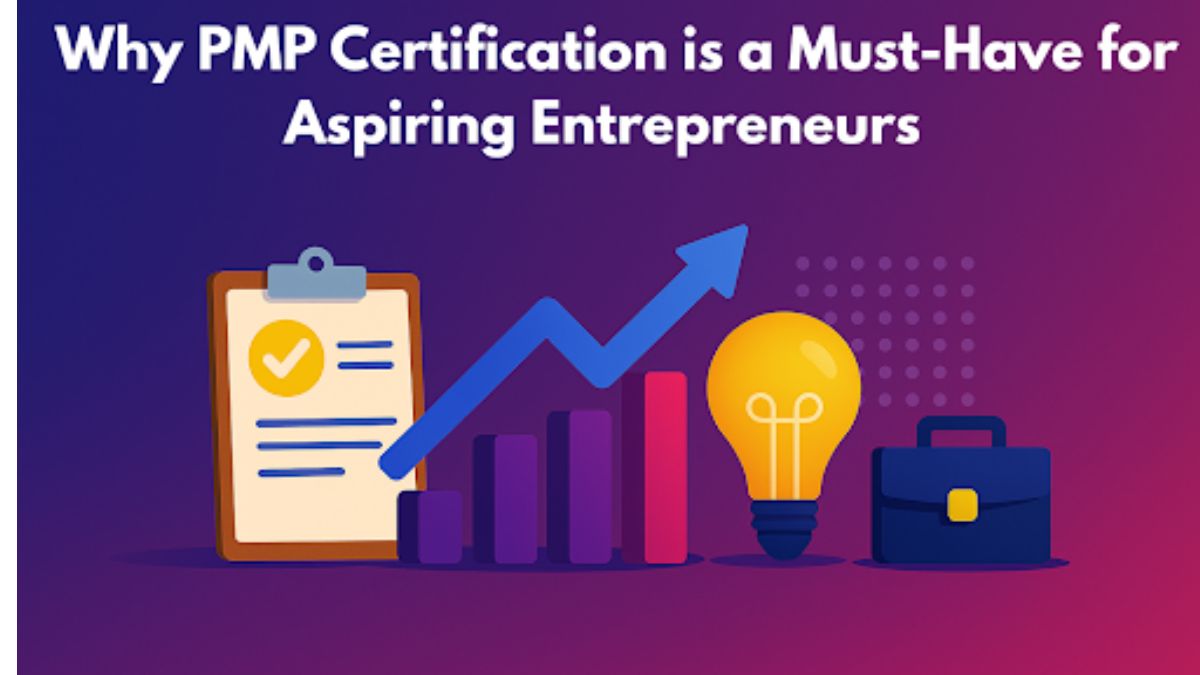BUSINESS
Why PMP Certification is a Must-Have for Aspiring Entrepreneurs

Are you an aspiring entrepreneur looking to improve your project management skills? Whether starting a small business or scaling a growing one, the Project Management Professional (PMP) certification can significantly enhance your ability to manage projects successfully. But why is it such an essential qualification for entrepreneurs?
In this blog, we’ll explore the numerous ways PMP Certification can benefit you as an entrepreneur and how it can provide you with the skills necessary to navigate the challenges of business development successfully.
What is PMP Certification?
Approved by the Project Management Institute (PMI), the PMP certification is a globally recognized credential for project managers. It shows that the individual has the knowledge and ability to properly oversee and guide initiatives, ensuring they are completed on time, within budget, and to stakeholders’ satisfaction.
To become PMP certified, candidates must pass a thorough exam and meet specific educational and professional experience requirements. Focusing on several project management approaches, tools, and strategies, the certification is a comprehensive qualification for anyone looking to manage projects effectively.
Why PMP Certification is Important for Entrepreneurs?
Entrepreneurs manage multiple initiatives, from product development to marketing campaigns and everything in between. PMP certification is valuable in this context. As a future entrepreneur, you must balance various tasks and deadlines while maintaining a long-term vision for business success.
PMP certification provides a methodical approach to project management that helps reduce risks and prevent costly mistakes. This is especially crucial for business owners when making decisions significantly influencing the company’s course. Furthermore, PMP certification demonstrates to clients, investors, and potential partners that you can manage projects professionally and understand industry best practices.
How PMP Certification Enhances Entrepreneurial Skills?
PMP certification gives business owners the essential knowledge needed to run their companies. These skills go beyond simple project management and find application in various aspects of entrepreneurship:
Improved Time Management
Managing time is one of the key elements of running a profitable company. Entrepreneurs with PMP certification acquire skills in task prioritization, resource allocation, and meeting deadlines. This ensures on-time completion of corporate projects, thus improving productivity and business efficiency.
Risk Management
Every business venture involves some degree of risk. Effective risk management is vital, whether the risks are financial, operational, or market-related. PMP certification provides business owners the tools to identify, assess, and mitigate risks, ensuring that projects are less likely to face unforeseen challenges.
Strategic Planning
Entrepreneurs must think strategically about their businesses to achieve growth. By learning how to break down complex business goals into manageable projects, PMP certification ensures that business plans are realistic, achievable, and aligned with the overall vision. This approach enables you to execute short-term projects effectively while staying focused on long-term objectives.
Better Communication and Leadership
Managing teams and building strong relationships with clients and stakeholders rely on effective leadership and communication. PMP certification gives business owners a framework for enhancing team collaboration and communication, two essential skills for running a successful company. The leadership skills gained through PMP also help entrepreneurs motivate their teams and steer their businesses towards success.
The Value of PMP Certification in Business Growth
Although PMP certification is often associated with large companies, small businesses can also benefit significantly from it. Having this certification makes entrepreneurs stand out in a crowded market. It gives stakeholders, investors, and clients confidence that their projects will be managed professionally, thus strengthening credibility.
Furthermore, PMP certification ensures you can manage more complex projects as your business grows. Whether scaling operations, launching new products, or entering new markets, the knowledge and skills gained through PMP certification will enable you to make informed decisions that drive your business forward.
Additionally, PMP-certified entrepreneurs are typically better equipped to handle growth challenges, coordinate multiple stakeholders, and work with cross-functional teams. These skills allow business owners to control their operations while pursuing expansion opportunities.
Conclusion
PMP certification is an invaluable asset for any aspiring entrepreneur. It provides the tools and techniques to manage projects effectively, mitigate risks, and improve time management. Consider The Knowledge Academy courses to enhance project management skills and advance your business.
BUSINESS
How can small businesses prepare for the Accessibility Act 2025? A UX checklist

The Accessibility Act 2025, also known as the European Accessibility Act (EAA), was introduced by the EU to ensure that digital products and services are accessible to all individuals, including those with disabilities.
For small businesses, this upcoming legislation offers a unique opportunity: by adopting accessibility-focused UX design, you can enhance customer satisfaction, improve your SEO, expand your reach, and avoid costly retroactive adjustments.
About the Accessibility Act 2025: Who does it affect?
The Accessibility Act impacts websites, mobile applications, e-commerce platforms, ticketing machines, banking services, and more. It sets out functional accessibility requirements that align with the WCAG 2.1 standards, especially the core principles of being perceivable, operable, understandable, and robust.
Although the law officially applies to certain sectors and businesses, it will inevitably influence the expectations of users and stakeholders across all industries. Even if your business isn’t strictly obligated to comply, failing to meet accessibility expectations could result in reputational damage, loss of customers, and eventually even legal consequences as enforcement expands.
Why UX design is central to accessibility compliance
The Accessibility Act UX approach is not just about checking boxes or fulfilling legal duties. It’s about creating better experiences for all users. When your website or app is intuitive, inclusive, and easy to navigate, you’re naturally moving closer to accessibility compliance.
For example:
- Clear layouts and readable text benefit both neurodiverse users and users with visual impairments.
- Keyboard navigation is crucial for users who can’t use a mouse, but it also helps power users and developers.
- Descriptive links and properly labeled form fields are good for screen readers, and they also help with SEO.
Rather than treating accessibility as a constraint, businesses should see it as a strategic design advantage. Inclusive UX is simply good UX.
Resources to help you comply with the Accessibility Act 2025
Compliance doesn’t have to be overwhelming. There are agencies and resources available to support businesses through the transition.
Ergomania – a popular UX agency – has also written a useful guide to help businesses prepare for the Accessibility Act 2025. Their article covers common challenges, case examples, and actionable steps to meet the upcoming standards.
Other resources you can rely on include:
- W3C’s Accessibility Guidelines (WCAG 2.1)
- EU’s Accessibility Act official documentation
- Free tools like NVDA screen reader and contrast analyzers
Accessibility Act UX checklist for small businesses
To further help guide your efforts, here’s a practical Accessibility Act UX checklist tailored for small businesses preparing for the 2025 deadline:
- Audit your digital environment
Begin by evaluating all customer-facing digital touchpoints: websites, mobile apps, online shops, portals, and digital documents. You can use tools like:
- Lighthouse
- WAVE (Web Accessibility Evaluation Tool)
- AXE browser extension
These tools highlight technical and content-related issues, from missing alt text to poor color contrast.
- Prioritize mobile and responsive UX design
The Accessibility Act 2025 doesn’t just apply to desktop experiences. Mobile responsiveness is essential. Make sure your mobile UX supports zooming, screen readers, and adaptable font sizes. All interactive elements should remain accessible and visible on different screen sizes.
- Ensure keyboard accessibility
One of the most fundamental accessibility requirements is that users should be able to navigate your site using only a keyboard. This includes tabbing through links, selecting dropdown menus, and submitting forms without a mouse.
- Use clear, structured content
Break content into scannable sections with headings, bullets, and consistent formatting. Make sure headings follow a logical order (H1 → H2 → H3, etc.), which helps screen readers and enhances usability.
- Label all interactive elements
Forms, buttons, and inputs should have proper labels that are announced by screen readers. Avoid vague CTAs like “Click here” and instead use specific labels like “Download our brochure” or “Submit your feedback.”
- Provide text alternatives
All images must have descriptive alt text. Videos should include subtitles or transcripts. For any audio content, provide a written summary or transcript. This step is both an accessibility best practice and a boost for your SEO efforts.
- Maintain sufficient color contrast
Your text should have enough contrast with the background to be readable by users with color blindness or low vision. Tools like WebAIM’s contrast checker can help you meet WCAG requirements.
- Include real-world testing
The best way to validate your efforts is to include people with disabilities in your testing process. User testing can uncover UX pain points and accessibility gaps that automated tools might miss.
Accessibility as a UX opportunity: It’s not just a legal obligation
Many small businesses view compliance through the lens of fear. Fear of fines, complaints, or losing customers. But adhering to Accessibility Act checklists isn’t just about legal compliance. It’s about creating user-centered, future-ready experiences.
Here’s what you gain by embracing accessibility:
- Wider audience reach: millions of people whom you haven’t been able to target before
- Enhanced brand reputation as an inclusive, customer-centric company
- Higher SEO rankings, since search engines favor accessible content
- Improved usability for all users, including those on mobile or in noisy environments
BUSINESS
Smart Habits of Debt Free People

Treating Finances Like a Lifestyle, Not a Chore
When you see someone living debt free, it is easy to assume they either make a lot of money or got lucky. But in most cases, it is about consistent habits and smart decisions. They treat their finances like a lifestyle choice, not a one-time task. If you are looking to move toward debt-free living, it helps to study people who have already made it. Borrowing their habits can give you a roadmap to success. Even those who have used debt settlement to overcome past mistakes can adopt these strategies to stay debt free for good.
They Know Where Every Dollar Goes
Debt free people are very aware of their money. They track their income and expenses carefully. This does not mean they obsess over every penny, but they always know where their money is going. They review their bank statements, use budgeting apps, or jot things down on simple spreadsheets. Being aware helps them catch bad habits early and adjust before small problems become big ones.
They Spend With Purpose
Every purchase is intentional. Debt free people ask themselves if what they are buying adds real value to their lives. Impulse buys are rare because they understand that small, unnecessary expenses add up over time. They enjoy treating themselves but only after making sure it fits within their budget. This mindset helps them avoid falling back into debt after paying it off, even if they previously went through debt settlement to get there.
They Save First, Spend Second
One of the most common habits is saving automatically. Debt free people set up automatic transfers to savings accounts on payday. They treat savings like any other bill that must be paid. This helps build emergency funds, retirement accounts, and savings for big purchases without having to think about it every month. Having money set aside also protects them from needing credit when unexpected expenses pop up.
They Avoid Lifestyle Creep
When people get raises or bonuses, it is tempting to immediately upgrade their lifestyle. Debt free individuals resist that urge. Instead of buying a more expensive car or moving into a bigger house, they often keep their living expenses stable and use the extra income to boost savings or pay off remaining debts faster. Avoiding lifestyle creep keeps them in control of their finances no matter how much they earn.
They Use Credit Cards Cautiously
Credit cards are not evil, but debt free people treat them like fire. They use credit cards for convenience or rewards but never carry a balance. If they do use credit, they pay off the full balance every month. They understand how fast interest can turn a small balance into a major debt problem. If they have struggled with credit card debt in the past, they might even choose to stop using credit cards altogether for a while.
They Focus on Long-Term Goals
Debt free people have clear financial goals. They are not just thinking about next month but about the next five, ten, or twenty years. Whether it is saving for a house, retirement, or a dream vacation, having long-term goals keeps them motivated. These goals give them a reason to stay disciplined with their spending and savings habits.
They Plan for Irregular Expenses
Most people forget to budget for non-monthly expenses like car repairs, holiday gifts, or annual insurance premiums. Debt free people plan for these costs throughout the year. They set aside a little each month into sinking funds so these expenses do not throw off their budget or force them into using credit when the bill comes due.
They Communicate About Money
If they share finances with a spouse or partner, debt free people talk openly and regularly about money. They set financial goals together, review budgets, and make joint decisions. Regular communication helps prevent misunderstandings and keeps both partners on the same page. It is much easier to stay debt free when both people are committed to the same plan.
They Learn Continuously
Debt free people are always learning. They read books, listen to podcasts, or follow blogs about personal finance. They stay updated on ways to save, invest, and manage their money wisely. This ongoing learning helps them adapt to changes in their financial situation and avoid falling into bad habits again.
They Ask for Help When Needed
Finally, debt free individuals know when to seek professional help. If they find themselves struggling or facing tough decisions, they are not afraid to consult a financial advisor, credit counselor, or tax expert. Some may have turned to debt settlement at one point but used it as a stepping stone, not a permanent crutch. Getting expert advice can prevent small problems from becoming overwhelming ones.
Building Your Own Debt Free Life
Becoming debt free is not about perfection. It is about building habits that protect your financial health over time. By following the examples of people who have succeeded, you can create a lifestyle that supports your goals and gives you the freedom to enjoy life without the constant pressure of debt. Start small, stay consistent, and watch how even the smallest changes can grow into lasting financial freedom.
BUSINESS
The Role of Translation Memory in Cutting Costs and Improving Consistency

Introduction
Translation Memory is a vital tool in professional translation services, enabling businesses to streamline their content localization and achieve consistent translations at a lower cost, making it a key component in comprehensive business translation solutions. In today’s global marketplace, when speed and accuracy are essential, businesses require more than just a staff of qualified linguists. They need a system that allows them to manage massive amounts of content efficiently without losing quality or tone. This is when Translation Memory (TM) comes into play. By automatically storing and retrieving previously translated text, TM offers an intelligent and strategic approach to resource optimization. Whether you’re handling technical documentation, marketing content, or user interfaces, TM ensures consistency and lowers translation costs, which are two critical components of any effective worldwide communication strategy.
What is Translation Memory and How Does it Work?
Translation Memory is a linguistic database that stores parts of previously translated text — typically phrases, sentences, or complete paragraphs — for reuse in future translation projects. When a translator starts working on a new text, the system immediately looks for matches in the TM database. If a match or a partial match is identified, it makes a proposal that the translator can accept as is or change to fit the context.
This not only speeds up the translation process but also ensures that the exact phrases are consistently translated in the same way throughout all papers. The TM becomes richer with time, evolving into a bespoke resource tailored to a company’s voice and vocabulary.
Translation Memory works seamlessly with translation API integration, enabling businesses to automatically synchronize content with existing translation databases for faster and more consistent results. This implies that any content updates, additions, or changes are immediately detected and linked to current translations, resulting in quicker and more consistent results across the board.
How Translation Memory Cuts Costs
One of the most apparent advantages of Translation Memory is the cost savings it offers. Translation costs can quickly escalate for companies that manage multilingual websites, product manuals, or mobile apps. TM immediately solves this by minimizing redundancy. Once a line or phrase has been translated and saved, there is no need to pay for it again in subsequent projects. Instead, translators can recover and reuse the same section, significantly reducing the overall number of words that require manual translation.
Another significant advantage is speed. Linguists can move more quickly through projects when they use fast human translation technologies supplemented by translation memories (TM). When much of the work has already been pre-translated, their responsibilities move to reviewing and fine-tuning, saving both time and money.
Consistency is also essential for cost efficiency. Inconsistent translations can lead to confusion, require additional review rounds, and even result in costly errors. TM prevents this by maintaining consistent vocabulary and style across all material types, including legal agreements and marketing slogans.
Ultimately, by utilizing a professional translation service online that supports terminology management (TM), businesses can achieve more predictable budgets. You’re not paying for the duplicate content twice, nor are you over-investing in corrections and rework. It’s a more innovative, more scalable approach to global communication — one that pays off with each project completed.
Enhancing Consistency Across Translations
Beyond saving money, Translation Memory is a powerful tool for maintaining consistency, which is essential when your content spans multiple countries, languages, and platforms. From product descriptions to help center articles, a consistent voice strengthens brand identity and builds trust with users.
TM ensures consistent terminology, so the exact words are translated the same way every time, across all markets. This is crucial for industries with technical jargon or regulated content, where even a slight variation can change the meaning or create confusion.
It also contributes to a consistent appearance. If one translation employs a formal tone and another adopts a casual one, the reader’s experience becomes fragmented. TM provides a foundation of previously authorized translations, ensuring each contribution remains consistent with the desired tone.
Consistency reinforces your brand’s voice. Regardless of the language used, your messaging should appear to be consistent with that of the same firm. TM makes it possible.
When it comes to modern solutions, hybrid translation solutions are beneficial. By combining AI-powered TM with human oversight, organizations achieve the best of both worlds: the speed and scalability of machines combined with the nuance and emotional intelligence of humans. It also addresses the ongoing debate between AI and human translation: while AI can process data quickly, only human translators can ensure that idioms, cultural sensitivities, and brand tone are maintained. TM allows both techniques to stay on the same page.
The Impact of Translation Memory on Project Management
Translation Memory is more than just a linguist’s tool; it’s a project manager’s secret weapon. By incorporating TM into translation workflows, teams can optimize processes, eliminate bottlenecks, and increase overall productivity.
When translators have access to a well-maintained translation memory (TM), they spend less time researching terminology and reviewing prior translations. This reduces back-and-forth communication, enabling project managers to maintain timetables and deliveries on schedule.
TM also increases cost predictability. Managers can break down projects by the percentage of new, fuzzy, or repetitive material rather than predicting expenses based on the total length of the document. This enables more precise forecasting and better resource planning.
Translation API integration makes managing multilingual projects more efficient by enabling automatic updates to your Translation Memory, ensuring that any changes in source content are immediately reflected across all languages.
AI vs Human Translation: The Role of TM in Both Approaches
In the increasing debate between AI vs human translation, Translation Memory serves as a common thread that benefits both parties. AI-powered translation tools, particularly those integrated into larger systems, rely significantly on TM to enhance speed and accuracy. These technologies use TM to identify patterns and give pre-translated portions that fit into new settings, making the process extremely quick.
However, AI cannot currently understand cultural complexity, comedy, and emotion, making human translators necessary. For them, TM serves as a support system, enhancing productivity without compromising quality. It enables them to concentrate on the more imaginative and context-sensitive components of language.
While AI-powered tools can quickly process content with Translation Memory, hybrid translation solutions that incorporate human translators ensure that translations are both accurate and culturally sensitive.
Best Practices for Using Translation Memory Effectively
To get the most out of Translation Memory, organizations should use it like a living resource. This entails frequently updating your TM with new translations to match changes in branding, product updates, or regional adaptations.
It is also crucial to utilize QA tools to verify and confirm the accuracy of stored segments. Poorly translated text in the TM can lead to long-term discrepancies if not resolved promptly.
Finally, always combine TM with the knowledge of a qualified linguist. Professional translation services ensure that your Translation Memory is always up-to-date, maximizing efficiency and consistency across all your global content.
Conclusion & Takeaways
Translation Memory is not only a technical capability; it is a game-changing component of modern professional translation services. It becomes a crucial component of any effective business translation solution by lowering costs, increasing delivery speed, and improving consistency. For businesses looking to expand abroad while keeping their voice, tone, and messaging, TM is not only beneficial but also crucial.
-

 BLOG5 months ago
BLOG5 months agoSlothokiturbo.net: Exploring the World of Online Gaming and Community
-

 BLOG2 months ago
BLOG2 months agoLiteroticatags: Exploring the World of Erotica and Its Online Community
-

 TECH6 months ago
TECH6 months agoMansrufer: Pioneering Progress in Technology
-

 BLOG5 months ago
BLOG5 months agoUse 1.5f8-p1uzt – A Comprehensive Guide!
-

 BLOG6 months ago
BLOG6 months agoErothtos: Understanding Its Role in Today’s World 2025
-

 BLOG6 months ago
BLOG6 months agoWatchmenontheall Calvin: An Exploration of Themes, Characters, and Significance
-

 TECH6 months ago
TECH6 months agoEggFinder TX Rev C5: A Comprehensive Review and Guide
-

 BLOG2 months ago
BLOG2 months agoJonathonSpire: We Learn About Her Career
